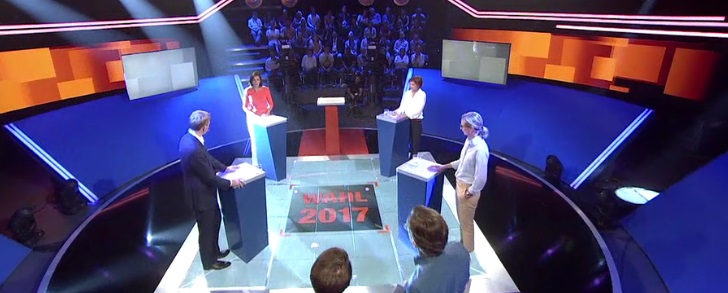The anti-immigration AfD, the neo-liberal Free Democrats (FDP), the leftwing Die Linke and the Greens mostly agreed on social issues. Only their views on immigration caused more division during the Sat.1-Wahlarena programme.
AfD leader Alice Weidel demanded effective border control in order to stop potential terrorists from crossing into the country. Deportations of failed asylum seekers, was key she said, adding that “negative arrivals” should be the goal.
But Green Party leader Katrin Göring-Eckardt rejected closed borders. The former East-German said “it felt like the GDR” to be closed in by borders. Anyone should be welcome in Germany, she said.
The AfD and FDP both called for an immigration law based on the Canadian model. In particular, imitating Canada’s use of specific criteria – like education level and work experience – to tally a number of points to evaluate candidates for immigration.
For Germany, the debate over how to manage immigration with the country facing a demographic chasm, is heating up. The working-age population will contract by nearly seven million over the next 10 years, according to the proposal by the Social Democrats. Businesses are already complaining about the difficulty of finding highly skilled employees, as Merkel’s policy have allowed in a wave of unskilled and uneducated migrants.
A survey commissioned by Bild newspaper published on Tuesday revealed that the majority of Germans reject the idea of migrants legally reuniting with their families. Over 58 percent of interviewees rejected the notion family reunification whereas around 42 percent supported it, the survey showed.
FDP leader, Christian Lindner said that Germany needs to be free to choose who joins its labour force. The FDP together with the AfD called for tax cuts to increase spending power.
All four leaders said they wanted a better equipped police force. AfD leader Alice Weidel suggested that police wear cameras on their helmets and be given more scope to use DNA evidence during investigations.
The four were united in identifying the need to deal with poverty in old age, while Die Linke leader Katja Kipping told viewers that her party was calling for an increased minimum wage.
There was also broad agreement on health care. Weidel, Kipping and Green Party leader Katrin Göring-Eckardt wanted an increase in hospital and care givers.
Some 40 percent of German voters have not made up their minds yet, making the race hard to predict. Analysts have suggested that six parties are likely to be presented in the next Bundestag, in coalitions.
Both CDU and SPD have ruled out a coalition with the AfD. That could mean the CDU/Green/FDP or SPD/Green/Die Linke.
The next debate in Germany’s electoral campaign season, the so-called “television duel” between Angela Merkel and Martin Schulz is expected to draw almost 30 million viewers, half of the electorate, according to a poll by research firm Forsa, commissioned by Stern magazine.
















